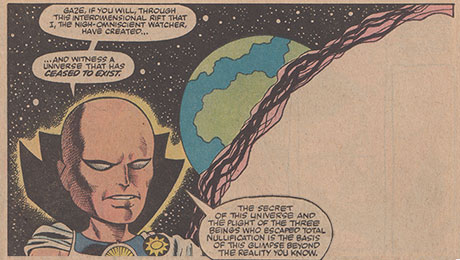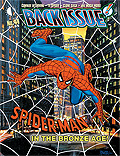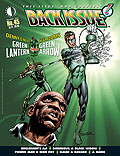 Doug: The attention around John Carter, Warlord of Mars has me thinking about other "timeless" characters. Since we're all pop-o-philes around here, I'm wondering today about a very broad discussion of characters -- comic, film, literary, pop-culture -- you name it. My question to you is about staying power.
Doug: The attention around John Carter, Warlord of Mars has me thinking about other "timeless" characters. Since we're all pop-o-philes around here, I'm wondering today about a very broad discussion of characters -- comic, film, literary, pop-culture -- you name it. My question to you is about staying power.Doug: I think anyone out there would freely admit that between Edgar Rice Burroughs' two most famous creations, John Carter is pretty far down the public consciousness meter. Tarzan? There probably aren't too many folks around who could attest to never having heard of the Lord of the Jungle.
 Which reminds me of a thought I read many, many years ago; I believe it was in an annual almanac, and may have actually been in the preface of the section on pop culture. Anyway, the author said there were a handful of fictional characters who were known worldwide. Among those on the list were Tarzan, Superman, and Mickey Mouse.
Which reminds me of a thought I read many, many years ago; I believe it was in an annual almanac, and may have actually been in the preface of the section on pop culture. Anyway, the author said there were a handful of fictional characters who were known worldwide. Among those on the list were Tarzan, Superman, and Mickey Mouse.Doug: Just this past week I saw a picture of Johnny Depp as Tonto in a still promoting an upcoming Lone Ranger revival. I don't know that I've thought too much about the Lone Ranger in the past several years. So there's our question for this Sunday -- who are the characters in our various cultures that you think will still be relevant decades from now? Who has that intergenerational staying power? And why do we keep coming back to them? As usual, thanks in advance for you participation today!




















































22 comments:
Let's see...
The first ones that leap to my mind are:
James Bond.
Sherlock Holmes.
Dracula.
Frankenstein/Frankenstein's Monster.
Dr Who.
Robin Hood.
King Arthur.
This is a tough question indeed. Because I've always thought the list to be quite small. To get on it, a character must need nearly no explanation to anyone. That's tough.
Superman for sure. I think Batman has made that jump in recent times.
Mickey Mouse might be an entity that's known, but I doubt most folks think of him as a character much anymore, but just a brand like Ronald McDonald (whatever happened to him by the way).
The classic monsters are fading a bit. Vampires seemed to do well, but the classic Dracula seems to have lost his edge though they still trot out the name quite a bit. Frankenstein Monster is there but Wolfman is likely not.
James Bond might've been once upon a time, but I suspect he's lost that universal quality in the last few decades. Too much competition.
Sherlock Holmes seems to have become part of the fabric, so I'd go with that for sure.
Spider-Man might get on the list. I remember being surprised at the universal appeal of the character when the first Spidey movie broke some years ago. Everyone I knew (young and old) wanted to see that movie or knew it was coming out.
Captain America seems to be a superhero that requires no explanation, though I suspect he's a bit culturally limited.
Cowboys do well on these kinds of things, and "John Wayne" or "Clint Eastwood" on the list. Not so much as movie stars, but as for the universal nature of the type of character they played. Wayne was the same regardless of what name the character had. Same for Eastwood's westerns. They have a far reach.
Tarzan for sure. No one I've talked to knows a dang thing about John Carter, but I always say he was created by the same guy who created Tarzan and they immediately go "Aha!". That's a pure test for this kind of fame, Tarzan needs no introduction, but rather he's the frame of reference.
Rip Off
As far as the superhero genre is concerned, Superman, Batman and "newcomer" Spider-Man seem to have mythic status- the latter more so than Billy Batson or Dick Grayson because he's the Kid Who Becomes a Hero.
The Hulk and (perhaps controversially) Wolverine tap into the Mr. Hyde/Wolfman tropes so they might make that first echelon if they acquire the cultural "gravity". Wonder Woman however, doesn't tap into cultural wish-fulfilment beyond the level of irony and kitsch, no matter who she threatens to castrate or blind.
In mass-market sci-fi, once upon a time, Mr. Spock was a trope and a symbol in his own right: the cerebral outsider who only needs the right kind of contact to release his emotions (read: sexual energy).
I hope Dr. Who will see out another twenty-thirty years but he in part very much belongs to the Victorian/Edwardian idea of the Gentleman Amateur-fused with British comedy of class and manners and (nowadays) soap opera romance.
I don't know. . . I think you guys may be casting too wide a net-of-inclusion, as it were. If we're talking worldwide recognition/relevance, then you have to assume a near-Beatles level of saturation and insinuation into pretty much everyone's culture. Superman & Mickey Mouse are solid candidates, largely because they managed to dominate several forms of media in the last (gulp!) 80 years or so. Comic books, newspapers, radio, television, movies and franchise-enhancing merchandising empires. Tarzan isn't quite as dominant, but his story's been around a bit longer, since he started as literature, and his story oddly has a universal appeal, regardless of culture. If that appeal has to break through a western (or euro/american-centric) cultural barrier, though, how does the list fare? What figures or characters will kids (or adults) in Cairo, in Bangladesh, in Tokyo, in Carson City, in Buenos Aires, in Lisbon, in London, etc, etc all be familiar with?
Of the ones discussed above, I think Sherlock Holmes and Spiderman may be the only "pop" culture figures with that kind of generations-long staying power. Honestly, I don't see the Lone Ranger hanging on much longer beyond this attempted revival. It seems like every five to ten years there's an attempt to reignite that long-spent fire-- and I don't recall it working yet. Boy, Johnny Depp wearing a dead crow as a hat. . . I dunno if that's gonna do the trick, either.
I also think it would be worth watching the ebb & flow of Harry Potter's popularity in decades to come-- he could well have that elusive staying power.
Oops- need to make breakfast---
HB
I think the Lone Ranger is fading a bit due to the fact that the audience for the old Clayton Moore(or John Hart)tv show is aging and attempts to revive the character have been unsuccessful, as humanbelly mentioned. Same goes for cowboys in general, their popularity seems to be on the wane.
I think Tarzan is fading because the world today isn't crazy about a white British guy being the Lord of the (African) jungle isn't something audiences are comfortable with. Plus,in my lifetime movies like 'Greystoke' have failed to catch on. Yes, the Disney animated Tarzan did well, but that character seemed quite different from the original pulp heroes. It felt more like 'George Of The Jungle'.
I'd say Superman,Spider-Man, Batman and Mickey Mouse are known worldwide. I don't know that I'd say the same about the other examples here.
Like a few others mentioned above, I agree that Batman and Spider-man will probably have the same durability as Supes, Micky and Tarzan. They are already now recognized in much of the world, by far more people than those who are into comics, or even cartoons and movies.
Dougie makes a good point about Spock, and I would add that Captain Kirk, as well as the whole Star Trek mythos in general, have the far-reaching recognizability that leads to references in other media, genres, etc. as well as politics and everyday life.
Same goes (perhaps even more so) for Star Wars, and particularly Darth Vader - both are instantly recognizable and have spilled over into all kinds of references and metaphors far beyond the realm of pop culture. Remember that Reagan's Strategic Defense Initiative was immediately dubbed "Star Wars," while more recently a rather widely disliked U.S. vice president was given the nickname "Darth."
the phantom is hugely popular just about everywhere but the u.s.
--matt alias anonymous
i think many commenters are confusing worldwide fame with u.s. fame. tarzan has not "faded." he is HUGE outside the u.s. much bigger than batman or spider-man, probably because superheroes are mostly an american phenomenon that never really caught fire elsewhere.
--matt alias anonymous
I put up a painting of Hercules, or Heracles, if you will.
How about the Three Musketeers (King Arthur was a good nominee, Steve!)? And Robin Hood does indeed seem to stay alive, doesn't he?
Doug
Matt makes a very good point about being overly Americentric, but I stand by the points I made, as my perspective is influenced considerably by the fact that I've been living outside of the U.S. since the early 1990s.
And Doug, re: Robin Hood. Yes, indeed: a very durable character and symbol, and very widely recognized.
I wonder if there's a distinction of between characters of ancient myth/classical literature, and characters created for pop culture, as it were? Hercules actually kinda trumps everyone, when you think of it, as he's hung around for several centuries, and his origins lie in an ancient Mediterranean civilization-- although he's arguably almost a religious figure, as he's a descendant of that people's pantheon of gods. There's no doubt he'll still be popping up several generations from now, one way or another.
But a Mickey/Spidey/Supes level of visibility--- even media dominance? Sustained for decades? (about 80 years for Supes & Mickey; about 50 for Spidey) I don't know-- seems like we'd be due for another candidate pretty soon. Perhaps it would be more likely to come from Japan or South Asia this time around-?
HB
HB -- Godzilla?
Most of the characters Alan Moore used in his League of Extraordinary Gentlemen were from 18th-19th Century literature -- that's staying power. I'm not sure Spider-Man, at a mere 50 years, has qualified yet for the true scope of today's conversation. Certainly he's on the rise in terms of worldwide fame -- but will he be there in another 200 years?
I suppose another issue is whether or not themes will continue but perhaps characters will rise up to replace existing ones. After awhile, let's face it -- it's hard to have a truly original idea.
Doug
Godzilla has become a metaphor or eponym for a monster; people who have never seen a Japanese monster movie usually understand the allusion in terms like "Bridezilla," "dogzilla," and "birdzilla." Just as people who have never read Mary Shelley's book or seen the movies will understand "Frankenstein" or "Frankenstein's monster" to mean a monster or a project that got out of control. And everyone understands "Jekyll and Hyde" to mean a split personality.
It's very likely that certain themes will continue with new characters. They already have. Star Wars draws on legend and myth with the young apprentice hero and wise mentor. Dick Tracy is a modern morality play. Samurai stories have been remade as Westerns. Forbidden Planet was a science fiction version of The Tempest. Superman combines themes from mythology and religion (Samson, Hercules), and literature (Zorro and the Scarlet Pimpernel posed as wimps in their secret identities).
Re your observations about Hercules (aka Herakles), HB, I'd also note that although he was an important religious figure prior to paganism essentially being outlawed in the classical Greco-Roman world to make way for the rise of Christianity, Hercules also was clearly a popular character to use in a variety of stories, just as Thor was among the Germanic/Norse peoples, and several of those stories weren't particularly flattering to the gods! Indeed, in several of them, Herc & Thor come out looking rather foolish & naive. I'm sure there is some serious scholarship on these stories although I'm not aware of any.
With the movies, Hulk & Spider-Man likely have increased their standings among the worldwide popular modern pseudo-mythic figures. Of course, we're mostly counting those that sprang from the minds of Anglo-American creators, but I wonder about those from other parts of the world, whether mainland Eurasia, Africa or Latin America that may be well known in other regions but obscure to most native English-speaking people. Would Tintin or Asterix count? Or Godzilla or other characters from Japanese literature, films or manga? Then there's someone like Bruce Lee, like John Wayne a real person who became a cultural icon for the roles he played. How has his status persevered in Hong Kong or other parts of Asia?
Also, there are the universal bad guys. The Joker is likely the top dog by far among those to emerge from American comics while Darth Vader may take the spot in regard to films. Even top-grossing films don't seem to have elevated public familiarity with Lex Luthor, Dr. Doom, Magneto, Red Skull or Kingpin. I suspect Luthor's problem in comparison with the Joker is that whether he's wearing some sort of far out space suit or business attire, his appearance is too generic to stand out. But a guy in a purple suit with green hair and a chalky-white face with a maniacal grin? And topped off with memorable performances by Cesar Romero, Jack Nicholson and Heath Ledger? That'll stick in people's minds.
Star Wars and Star Trek have replaced Buck Rogers as the popular metaphor for science fiction and space age technology. As noted, the Strategic Defense Initiative was immediately nicknamed Star Wars. And Captain Kirk has replaced Buck Rogers and Flash Gordon as the iconic stalwart space hero. I doubt if John Carter will attain that kind of status, but then, you never know.
I'm afraid the Lone Ranger is just too wholesome and idealistic for modern fanboy audiences. And if they make him grim and gritty, he wouldn't be the Lone Ranger anymore. The idealism is an integral part of the character. Similarly, the original (Shazam) Captain Marvel worked in clean, unpretentious, tongue-in-cheek stories. DC has never been able to update him or assimilate him without ruining everything that made the character appealing in the first place.
The most obvious suspects have pretty much been covered. Sherlock Holmes, Tarzan, Superman, Batman, Spider-Man, etc. I found it interesting that a couple of people mentioned Godzilla. I agree with that one. Along the same lines we might could add King Kong to the list.
Fred W. Hill had a very good post. I agree with everything he said. He mentioned Bruce Lee which I thought was brilliant. Even though not a fictional character, he is a person who has taken on a legendary status of mythical proportions since his untimely death. Forty years later his influence can still be felt in almost every martial arts movie made. Ranging from subtle inspirational homages to out and out mimicry.
On another note. Until today I didn't even know they were planning a Lone Ranger remake. I can tell you right now they are going to get some flack for casting Johnny Depp as Tonto, and not a Native American. I really don't understand that casting decision. I know that Depp has star power, but still, it's going to be hard to accept him as Tonto.
Actually William, I was going to write the same thing about Depp in regard to his casting. However, after consulting that bastion of historical accuracy we call Wikipedia, I did find a quote from Depp where he attests to having some Native American "blood" (whatever that means). So I tabled my snarky comment about this denigration and the merits of Kevin Costner's opus Dances With Wolves.
Doug
It's ironic that Tonto was played by real native American actors in the 1930's, '40's, and '50's, before political correctness was an issue.
Mickey Mouse may seem more of an advertising mascot than a character, unless you are old enough to remember Floyd Gottfredson, Carl Fallberg, and Paul Murry. But the preschoolers watching the Mickey Mouse Clubhouse now may someday remember him as a character in children's stories, if not as an action hero.
It was Harlan Ellison who wrote, in 1988, that there are only five characters in all of literature that are recognized all over the world, regardless of culture, age, or race: Robin Hood, Sherlock Holmes, Tarzan, Mickey Mouse, and Superman. That was 24 years ago. Today, I'm tempted to add Batman and Captain Kirk to the list. And maybe Snoopy.
Post a Comment